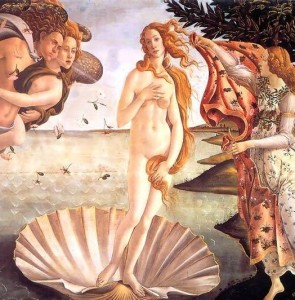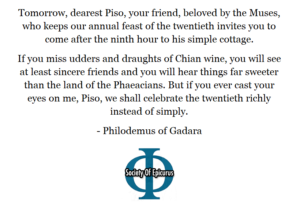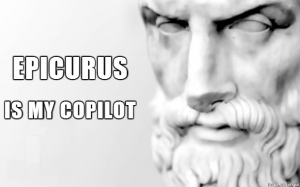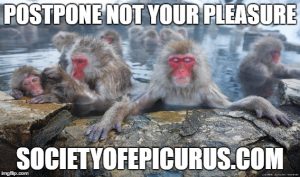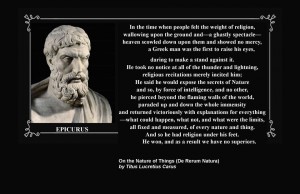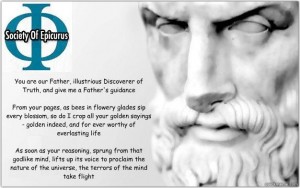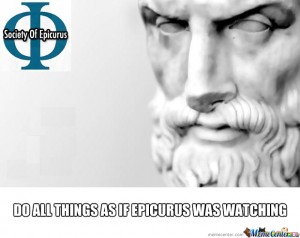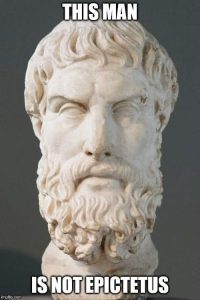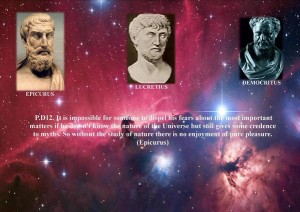Karl Marx’s fascination with the ancient atomists led him to base his dissertation on Democritus and Epicurus: an early symptom of his future career as a materialist philosopher. However, from their respective vantage points in history, Marx and Epicurus both reacted against idealists ancient and modern. In our view, they are all just different flavors of Platonists and it is important to notice the threads that link how these two (and other) materialists have reacted to the prevailing forms of idealism in their generations.
When Epicurus was exiled, thrown out from Lesbos by the Platonists, he nearly lost his life. Such was the mutual hostility between Epicureans and Platonists from very early on. There is a narrative in our tradition of exile … and of course of reemergence as sure as there is annual reemergence in nature, because the immediacy of nature can only be ignored briefly, and to our detriment.
Marx’s writings on the German idealists remind us of how easy it is for idealism to divorce us from reality and of how intellectual cultures can emerge that are very out of touch with the tangibles of the surrounding culture, imagining and inventing causes and trends to evident phenomena that oftentimes have more to do with ruling-class agendas than with reality.
In Epicurean therapy, such misconstruction of reality would likely result in misdiagnosing the diseases of the soul. Philosophy would not be able to heal human suffering, and it would not even be worthy of its name. This is why Epicurus persistently reminded us to always base our discourse and our philosophy in the study of nature, in great part an ancient euphemism for science. But the (Christian) Platonists won the culture wars in antiquity and closed the materialist schools of philosophy, and by the time Marx came around, all philosophy was speculation and, in one of his diatribes against the idealists, he said
Philosophy and the study of the actual world have the same relation to one another as masturbation and sexual love – Marx, in his Philosophy and Reality
For a concrete example of how materialism keeps us grounded, I should cite an example from recent discussions in the Garden of Epicurus forum on Facebook, one which awakened some passions on both sides.
Faced with the blind praise of free-market neoliberalism, which has been attempting to pass for a contemporary political theory of libertarian ‘autarchy’ in some circles, I had to present the challenge of the Water Wars, the (past and) future conflicts that are expected to arise as water becomes more scarce, insofar as it is privatized. I also cited the President of Nestle Peter Brabeck, who recently said that people don’t have a RIGHT to water and that it’s a commodity that should be privatized, not regulated. Water, to him, should be subject to market fluctuations.
The practical repercussion of this worldview, which is rooted in the doctrinal adherence to (neoliberal) free market “ideals”, is that it should be up to the “wisdom” of the markets to decide whether a child (or adult citizen, for that matter) should have access to drinkable water … or to education, or to healthcare, etc.
In my piece The Water Wars, I explain in more detail the potentially catastrophic effects of this way of thinking, if it translates into policy on a global scale, citing specifically the example of Bolivia and how, during its water wars people died on the streets after all the water, including that which fell from the sky, was privatized and sold to an American company (Bechtel). It was made illegal to gather rain water, and the price of water increased so sharply that retired Bolivians had to go back to work and people had to get their children out of school to be able to afford drinkable water. These events were mostly not covered by corporate-owned U.S. media.
All these sacrifices –including, literally, human sacrifices as people died on the streets defending their access to a resource that has always fallen from the sky for free–, we must remind ourselves, were made in the name of the free market, a non-entity whose “wisdom” we are being advised not to meddle with.
And so we see that it is not just religious idealism that generates unnecessary suffering when we deny gay people access to health care, or when we stone women for adultery or kill our daughters to defend our honor, or when we –out of undeserved respect for the sincere faith of others– fail to subject a caste of priests who happen to be sexual predators to the judicial process that is due. Yes, religious humanity still does these things, but there is another moral evil at loose in secular false philosophies that are divorced from our facticity, from recognizing that, without meeting our basic needs, we dehumanize ourselves, and that meeting these needs is a pre-requisite to our full humanity and dignity.
If, rather than blindly follow idealist doctrines –whether secular ones like the free market, or the religious kind– even when they lead to the unnecessary sacrifice of our humanity, we root our ethics firmly on the Canon, we will never lose sight of the pleasure versus the pain generated by water scarcity and by whether we engage in diligent public management of this and other basic resouces. We will be able to always recognize (and will want to naturally meet) our basic material needs.
Led by our materialist teachings we’ll be able to conduct hedonic calculus and conclude that, even if (for whatever reasons) we greatly or moderately value free markets, we must abandon its doctrinal adherence for the sake of our survival. We will recognize, as common sense dictates, that we want to live safe and comfortable lives without water wars, without the global threat of thirst and famine that may otherwise plague the future generations.
Of course, Marx and Epicurus dealt with idealisms and their detrimental impact differently, as Marx was a historical and political materialist whereas Epicurus was an ethical materialist and atomist. Our ideal of autarchy ensures that we meet our needs without the coercion and violence that political ideologies require of us. But meet our needs we must: nature gives us no choice.
Materialism is not just needed to protect our minds from idealist notions and the unnecessary suffering they generate. Truth is invariably a refuge from the ghosts of untruth, and a true epistemology, as well as true notions about the nature of things, help to support us against false ones.
Notice the sense of emergence that is presupposed in materialism. We believe that, first, there are atoms and molecules, then progressively more complex things. We believe that from inert matter emerges living matter, and that living things evolve by developing complex symbiotic relations with each other, and only then there emerges egoism, the self, the me versus another in struggle or cooperation, identity and consciousness.
But for the idealist, consciousness is a mysterious word that gets thrown around as if it automatically evidenced a non-natural or supernatural realm. Worse yet, and in spite of all the evidence that can be attained from the study of nature, they believe that consciousness came first (although it is more complex than inert matter). While it’s true that living entities have the power to influence their environment, this influence only occurs once they have emerged, once they have evolved consciousness. But all the living entities emerged from progressively simpler forms, all the way down to the stardust at the dawn of all things.
Contrary to what nature shows us to be true, the idealist has this false notion that, rather than emerge, all things rained down from heaven and are less real, somehow, than consciousness (which, to them, existed earlier than matter), or that material things emerge from consciousness. They believe that matter is to consciousness what the upside-down reflection of a tree in a pond of water is to the real tree, to cite an example from Hindu scripture.
The idea that the universe is “run” from the top down reflects a worldview that has obviously been favored by the ruling classes from the early times of the divine Pharaohs and god-kings. It’s old trickery, the vestige of a very old ideology, one that has absolutely no foundation in the study of nature. When we study nature, we see that there is absolutely no reason to suppose that things evolved backwards: they have always emerged and are always emerging.
Atomism is, therefore, still important. Matter is the sure ground that we must walk on if we wish to think of ourselves as true philosophers rather than speculators or false-faith-mongers. Materialism still matters!
Hiram Crespo, Founder of Society of Epicurus


